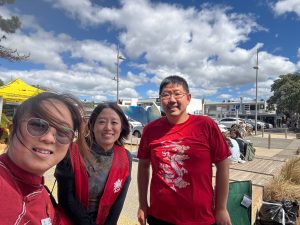The Chinese Family Network
The Chinese Family Network is a community-led initiative that brings together Chinese migrant families in Aotearoa to strengthen family connections, celebrate cultural identity, and support successful settlement. Their kaupapa is to create an inclusive, family-focused space where Chinese families—especially newcomers—can feel seen, supported, and socially connected.
The Network primarily supports Chinese migrant families, including recent arrivals and intergenerational households. Their activities aim to engage parents, children, and grandparents in culturally relevant and inclusive ways.
The Network offers community gatherings, information sharing on settlement topics, parenting workshops, and seasonal events that highlight Chinese cultural traditions. They act as a connector between families and local services.
As a newly formed group with ambitious ideas, the Network lacked experience in formal governance and event planning. They also had limited knowledge of how to access funding or engage with local agencies and councils.
While their community base was enthusiastic and growing, the organisers needed guidance on governance structures, how to approach funders, and how to confidently plan large-scale events.
Their immediate goal was to hold a large-scale, family-friendly outdoor event that would celebrate Chinese culture and connect migrant families with local services — but they needed expert support to turn the idea into a reality.
They were introduced to ANCAD’s work through community networks and other Chinese organisations that had received support in the past. They saw ANCAD as a trusted and culturally responsive source of advice that could help them navigate governance and funding systems. The prospect of receiving tailored guidance gave them confidence to move forward.
The Network’s core organising team, made up of passionate Chinese parents and volunteers, initiated the contact with ANCAD.
ANCAD provided one-on-one consultancy support, helping the Network understand governance basics, clarify their group’s purpose, and develop a practical funding strategy. ANCAD also guided them through planning for a safe, inclusive, and culturally meaningful community event.
Support was delivered mainly one-on-one, through personalised consultancy sessions tailored to the Network’s pace and needs. ANCAD provided templates and verbal guidance on funding applications, governance structures, and community engagement strategy. These helped the Network move from informal organising to more structured planning.
The Network wanted to create a visible, public celebration of Chinese culture that would bring together families, reduce isolation, and help Chinese migrants feel proud and connected in their local community. They also saw it as an opportunity to build relationships with local services and promote cultural understanding. They then organised kid’s flea market during the weekends for the children to experience life.
ANCAD’s practical guidance gave the organisers clarity on how to plan and manage the event — from developing a clear funding plan, to engaging local partners, to navigating council processes. Their advice helped the group avoid pitfalls and deliver with confidence.
The Family Day featured cultural performances, children’s games, information booths from local services, and traditional food. It attracted a diverse turnout and marked the first large-scale outdoor Chinese cultural event in Browns Bay. Local agencies also took part, using the opportunity to connect with families in culturally appropriate ways.
The event gave Chinese families a sense of visibility and belonging, celebrated cultural identity in a public space, and created new connections between families and local services. Many attendees described it as joyful, empowering, and long overdue.
The organisers now have a better understanding of governance responsibilities and the steps needed to access community funding. They feel more confident in working with funders, local councils, and other stakeholders.
The Family Day significantly increased their visibility and credibility, leading to greater community engagement and interest from other agencies. They’ve since begun formalising their structure to sustain their work into the future.
They described the support from ANCAD as supportive, culturally respectful, and empowering. ANCAD’s ability to meet them where they were, without pressure, was especially appreciated.
The Network hopes to build on the success of Family Day by offering more culturally based family events, developing a leadership group, and continuing to bridge Chinese families with wider community services.
They highly recommend ANCAD’s consultancy and capability-building support to other emerging ethnic groups, especially those with strong community energy but limited formal experience. The guidance they received helped them turn vision into action.
